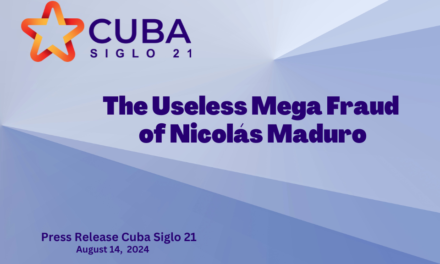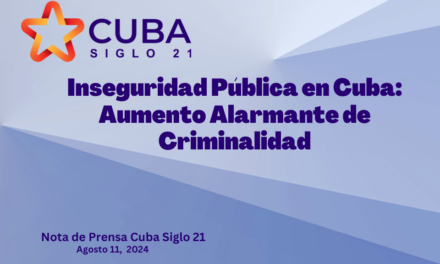Descargar informe completo en español
Download Complete Report in English
Ver resumen en español
See Summary in English
December 4, 2023. – The Cuban Observatory of Citizen Audit, OCAC for its acronym in Spanish, in its report Cuba: GAESA’s plundering of Health Security accuses the new Cuban oligarchy of having appropriated at least 69.8 billion dollars ($69,866,399,679), from the salaries of the doctors in the international brigades, which were never invested in the national health system as established by the Cuban government.
Among the report’s recommendations, OCAC demands that GAESA (including the International Finance Bank under its control), the Ministry of Public Health and the companies in charge of exporting medical services, open their books to fiscal and public scrutiny and proceed immediately to reimburse the health security system for the funds looted between 2009 and 2022.
GAESA, the holding company of the new Cuban oligarchy, making use of the International Financial Bank, not only robbed the doctors, but it also robbed the nation, thus fostering the dismantling of the public health system.
When faced with the first accusations of forced labor in that sector, in violation of international law, the Cuban government claimed that the salaries confiscated from the medical brigades would be reinvested in the national public health system. But this never happened. Annual statistics from Cuba’s National Office of Statistics and Information reflect a sharp disparity between the recognized income contributed by the brigades and the amount of investment dedicated to public health. The report also confirms that in the last 13 years, 13 times more was invested in the construction of new hotels than in the health sector.
A country’s health security is understood as the sum of several factors, including the state and universal accessibility to medical services, drugs and public health related services (sewerage, sewage treatment, access to drinking water, elimination of disease-spreading vectors, garbage and waste collection, among others). In all these areas, health security in Cuba is in free fall.
According to official figures, the number of hospitals in Cuba decreased by 32% between 2008 and 2018. (all rural ones were closed as of 2011) polyclinics by 9%, while all rural and urban medical smaller posts closed as of 2010. The country went from having a total of 312,406 employees as medical staff in 2021 to 281,098 in 2022. Health personnel decreased by 31,308 less in just 12 months, from 2021-2022. This category includes senior, middle and basic technicians, technologists, and other health graduates.
The lack of basic medicines has doubled this year compared to 2020. A survey conducted in August 2022 by the independent information and statistics site Cubadata showed that 46.7% of those surveyed considered it very difficult to obtain medicines in the country. During September, OCAC members visited pharmacies in 15 provinces and the special municipality of Isla de la Juventud. Information was gathered on the lack of medicines that are issued by control card (tarjetón) for medicines for chronic conditions, and those of first priority. In all provinces there was a lack of medicines such as analgesics, antibiotics, antihypertensives, antiparasitics, anti-inflammatories, anxiolytics and antidepressants.
The acquisition of missing medicines on the black market, in addition to the dangers associated with counterfeits, have prices inaccessible to many Cubans. A monthly treatment for chronic diseases that can only be acquired on the black market can be equivalent to more than 200% of the minimum pension. For example, Enapranil for high blood pressure and Amitriptyline for depression can cost 3,600 CUP, which represents 236% of the minimum pension of 1,528 CUP.
Health security today has two strata: those who have relatives in the diaspora or access to dollars, and those who depend on income in local currency. Hospitals also lack basic supplies and equipment for diagnosis and patient care, as well as to maintain the cleanliness and sterility of the facilities. Family members are responsible for obtaining supplies for any procedure on the black market.
In assessing the impact of unilateral economic sanctions in various countries, the UN Special Rapporteur has stated that the deterioration of the public health system in Cuba is due to this external factor, beyond the control of the Cuban government. OCAC considers this assessment erroneous. The real cause of the crisis in the Cuban health system is endogenous and systemic in nature: the deliberate abandonment of the State’s constitutional responsibilities towards the basic needs of the population. An additional fact: the embargo does not prevent the acquisition of health equipment and medicines in the United States.
Where did the 69.8 billion dollars go? How can we know if GAESA is not audited by the Cuban State? The accumulated deaths due to the absence of drugs to control chronic diseases, as well as of equipment and supplies to guarantee successful therapies and surgical interventions, are the inescapable responsibility of those who deliberately made the decision to abandon the State’s commitment to the health system and appropriate the resources that doctors generate abroad.
In conclusion: The current health insecurity of the population is the result of deliberate decisions emanating from the Cuban oligarchy that controls GAESA and the government of Miguel Díaz-Canel. It cannot be justified based on external factors such as U.S. sanctions, or fortuitous factors such as a pandemic.
About the Cuban Observatory of Citizen Audit
Cuban Observatory of Citizen Audit, OCAC for its acronym in Spanish, is an initiative of Cuban researchers, independent journalists and activists aimed at monitoring and evaluating components of Citizen Security in Cuba, including public, food, energy, and health security. OCAC works as a decentralized network and Cuba Siglo 21, a think tank, facilitates its management.
About Cuba Siglo 21
Cuba Siglo 21 is a Madrid-based non-governmental think-tank that promotes an open, democratic, and prosperous society based on the rule of law and a free market.







